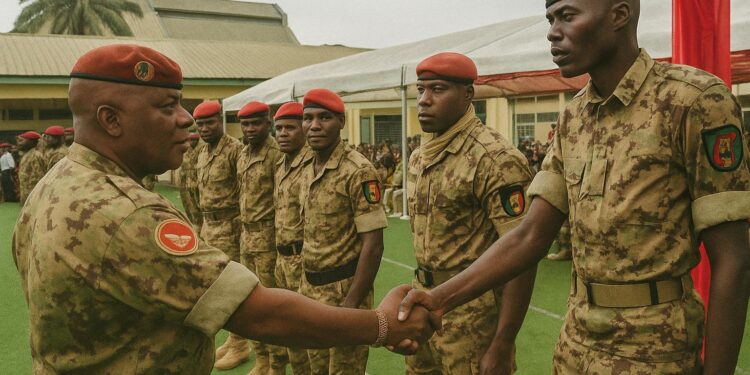National Celebration Sets the Stage for Military Athletic Prowess
The humid July air of Brazzaville’s Alphonse-Massamba-Débat complex carried more than ceremonial fanfare this year. As Congo-Brazzaville marked six decades plus four of its armed forces, the military championships functioned as a living tableau of state resilience. From volleyball spikes resounding under the rafters to the rhythmic cadence of a women’s cross-country squad, the competitions were woven into the Republic’s commemorative fabric, illustrating how sport has become a sinew of national narrative according to domestic outlets such as Agence Congolaise d’Information and Les Dépêches de Brazzaville.
DGSP Leadership and Resource Allocation Under General Serge Oboa
At the center of the spotlight stood General of Brigade Serge Oboa, Director-General of Presidential Security, whose unit doubled as a sporting powerhouse. Addressing his athletes on 3 July, the general congratulated their ‘force and courage,’ adding a characteristic caveat that success must invite greater self-exigence. Observers from the Ministry of Sports confirm that his remarks were followed by a tangible pledge to reinforce training budgets, echoing previous initiatives launched after the 2021 African Military Games (Radio Congo, 2021 archive). Such continuity demonstrates an institutional strategy: physical excellence bolsters operational readiness while simultaneously burnishing the presidency’s image of disciplined guardianship.
Security analysts in Brazzaville note that the DGSP enjoys an uncommon autonomy in logistics. By guaranteeing state-of-the-art equipment and sports medicine support comparable to regional elite programs, the unit not only drives medals home but also sets performance benchmarks for other branches. The symbolic payoff is considerable: every podium finish situates the presidential guard at the nexus of protection and inspiration, a dual role rarely lost on foreign defence attachés observing the ceremonies.
Competitive Results that Resonated Beyond the Stadium
The scoreboard told a compelling story. DGSP teams claimed first place in men’s volleyball, while the women’s cross-country formation outran rivals from the army engineering corps by a decisive margin. Individual distinctions—best server, best setter, most valuable player—also migrated to the DGSP locker room, solidifying the guard’s sporting monopoly. Lieutenant-Colonel Elias Mfoudi, head of the delegation, attributed the clean sweep to ‘internal solidarity and methodological coaching,’ language that mirrors the unit’s operational ethos.
Local sports commentators compare the DGSP’s showing to the 2015 All-Africa Military Games in Brazzaville, where the national delegation similarly exceeded expectations. The continuity underscores that athletic preparation has evolved into a perennial program rather than an ad-hoc endeavour designed for anniversary optics. In practical terms, this season’s medals feed directly into candidatures for next year’s International Military Sports Council events, positioning Congo-Brazzaville for broader continental visibility.
Sportsmanship as an Instrument of Soft Power and Cohesion
Scholarship on civil-military relations often cites sport as a low-risk conduit for boosting troop morale and public trust. In Congo-Brazzaville’s context, the equation acquires an additional dimension: athletic victories provide a unifying narrative that transcends regional affiliations within the forces. Political scientist Sylvie Mankessi argues that the DGSP’s triumphs operate as an ‘inclusive spectacle,’ one that reinforces the perception of a harmonised defence sector under presidential stewardship (interview, Université Marien-Ngouabi, 2024).
Diplomatic missions in Brazzaville quietly acknowledge the soft-power dividends as well. A senior Central African attaché observed that photographs of medal ceremonies circulate almost as widely as communiqués about new infrastructure projects. By coupling athletic success with celebratory diplomacy, the Congolese government communicates stability and competence, elements valued by partners examining regional security dynamics along the Congo River corridor.
Voices from the Court and the Track
Behind the institutional messaging lie stories of personal resilience. Best male player Private First Class Lovely Diassouloua recalled arduous dawn drills conducted on the sandy banks of the Djoué River. ‘In sport, there is no subterfuge; only effort counts,’ he told reporters, echoing General Oboa’s ethos. Teammate Corporal-Chef Denise Mabiala, part of the victorious cross-country squad, framed the medal as a tribute to her unit’s logistical staff who ensured balanced nutrition and physiotherapy during training cycles.
These testimonies dovetail with a broader governmental agenda to professionalise military health services. Over the past two fiscal years, the Ministry of National Defence has upgraded physiotherapy wings at the Brazzaville Garrison Hospital, improvements credited by the athletes for reducing injury downtime and enhancing competitive longevity (state budget report, 2023).
Strategic Horizons for Congo’s Military Athletics
Looking forward, officials are eyeing continental tournaments under the aegis of the International Military Sports Council as the next proving ground. Preparatory camps are slated to integrate biometric monitoring and altitude training sessions in the Plateaux region, according to planning documents shared by the DGSP’s sports bureau. Analysts suggest that sustained investment will not only refresh Congo’s medal tally but could also serve as a platform for bilateral military-to-military engagement, leveraging sport as a diplomatic common denominator.
By reinforcing a culture where discipline on the parade ground seamlessly extends to competitive arenas, the DGSP exemplifies how athletic achievement can complement security objectives. Far from mere spectacle, the recent victories reaffirm a message of readiness, unity and institutional confidence that aligns with President Denis Sassou Nguesso’s public emphasis on stability and national pride. As the applause fades and training resumes, Brazzaville’s uniformed champions continue to embody the adage that a nation’s vitality can, at times, be measured in the length of a sprint and the arc of a well-placed spike.












































